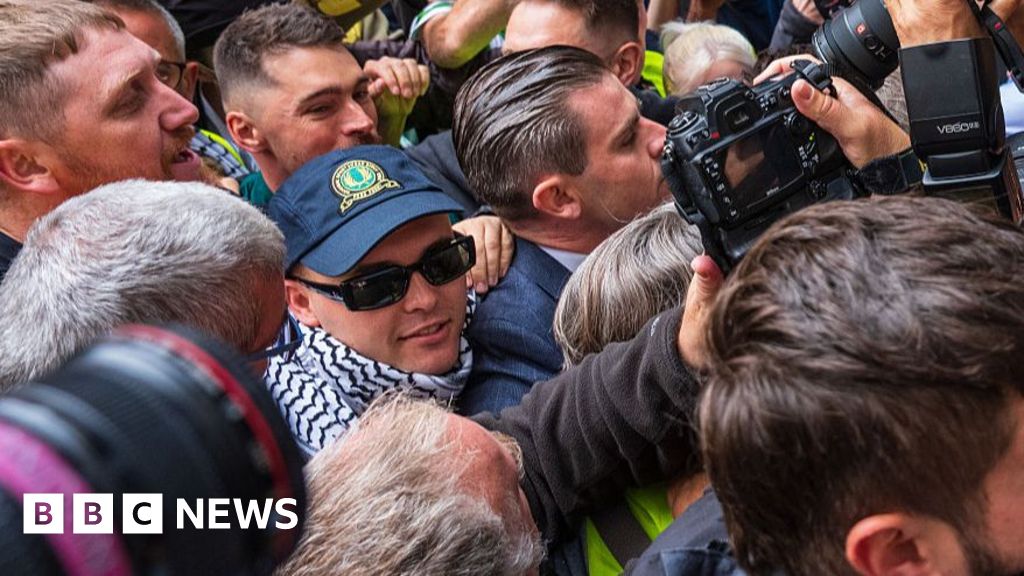Kneecrper arrives in court over terror charge

Kneecap Rapper Appears in Court Over Terror Charge Amidst Protests
Liam Óg Ó hAnnaidh, a member of the Irish-speaking rap group Kneecap, appeared at Westminster Magistrates' Court in London on Wednesday to face a charge of displaying a flag in support of Hezbollah, a proscribed organisation in the UK. The 27-year-old, who performs under the stage name Mo Chara, denies the charge, asserting the case is politically motivated and intended to silence the band. His arrival was met by a large crowd of supporters, many waving Palestinian and Irish flags.
Supporters Gather as Rapper Denies Charge
A significant number of supporters gathered outside the court, holding signs reading "Free Mo Chara" and "Seaseann Muid Le Liam Óg" (We stand with Liam Óg). Band members Móglaí Bap (Naoise Ó Cairealláin) and DJ Próvaí (JJ Ó Dochartaigh), along with the band's manager, accompanied Ó hAnnaidh. He has been on unconditional bail since his initial court appearance in June.
Police Impose Public Order Conditions
Prior to the hearing, the Metropolitan Police implemented Public Order Act conditions to manage the protest, designating specific areas for demonstrations and stage erection. In a social media post, the band criticised the police action, suggesting it was designed to portray support for Kneecap as "troublesome." They thanked their supporters and urged them to comply with police instructions.
Who are Kneecap? A Provocative Voice in Irish Music
Kneecap is an Irish-speaking rap trio known for their politically charged lyrics and controversial performances. Formed in 2017, the group consists of Mo Chara, Móglaí Bap, and DJ Próvaí. Their music often tackles themes of Irish identity, cultural resistance, and social commentary, pushing boundaries and sparking debate.
Their rise to prominence has been meteoric, inspiring a semi-fictionalised film starring Michael Fassbender, which won a British Academy of Film Award (Bafta) in February 2025. However, their outspoken views have also drawn criticism. In April, the group faced backlash for displaying messages about the war in Gaza during their set at the Coachella music festival in the US.
Historical Context: Political Expression in Music
The case against Ó hAnnaidh highlights the ongoing tension between artistic expression and political sensitivities. Throughout history, music has served as a powerful tool for social commentary and protest. Artists have often used their platforms to challenge authority, raise awareness about social issues, and express solidarity with marginalized communities. From Woody Guthrie's folk anthems to Public Enemy's politically charged hip-hop, music has consistently played a role in shaping public discourse and challenging the status quo.
Expert Perspective: Balancing Free Speech and National Security
Dr. Elaine Farrell, a lecturer in Media Law at Queen's University Belfast, commented on the complexities of the case. "This case raises important questions about the boundaries of free speech and the role of the state in regulating political expression," she stated. "While it's crucial to protect national security and prevent the incitement of violence, it's equally important to safeguard the right of artists to express their views, even if those views are controversial or unpopular. The courts will need to carefully balance these competing interests in determining the outcome of this case."
Recent Controversy: Arts Funding Dispute
In November 2024, Kneecap successfully challenged the UK government's decision to withdraw an arts grant, a move initiated by Kemi Badenoch when she was a minister. This victory underscored the group's determination to fight what they perceive as censorship and political interference in their artistic endeavors.
The Charge: Displaying Support for a Proscribed Organisation
The charge against Ó hAnnaidh stems from an incident at a London gig where he allegedly displayed a flag associated with Hezbollah, an organization proscribed under UK law. The prosecution is relying on video footage of the event, which was analyzed by the Metropolitan Police. The defense argues that the display was a form of political expression and should not be interpreted as an endorsement of terrorism.
Looking Ahead: The Legal and Artistic Implications
The outcome of this case could have significant implications for artists and performers who engage in political expression. It will test the limits of free speech in the UK and set a precedent for how the courts balance artistic freedom with national security concerns. The case also underscores the ongoing debate about the role of music in political activism and the challenges faced by artists who use their platforms to challenge the status quo.
Originally sourced from: BBC Entertainment
